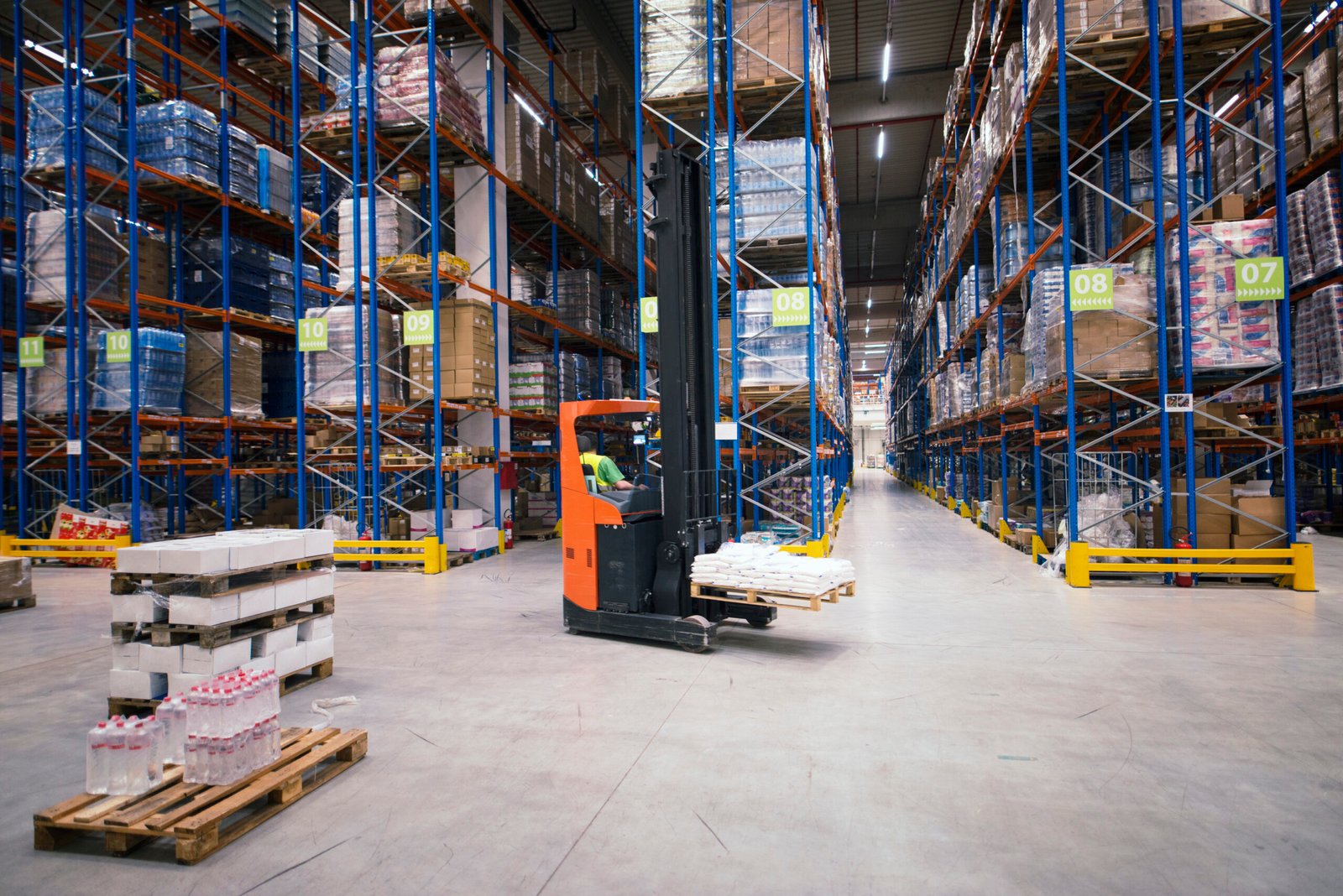What is 3PL (Third-Party Logistics)?
3PL (third-party logistics) refers to outsourcing inventory operations to a reliable external service provider. The provider can handle almost all inventory-related activities, including:
- Warehousing – Arrange warehouse space, organize inventory, track stock levels, manage inventory supply, etc.
- Order Fulfillment – Process, pick, pack, and ship orders.
- Transportation – Manage logistics.
- And many more.
Simply put, a 3PL provider takes the struggle of managing inventory away from business owners and improves efficiency. It brings the expertise, infrastructure, and technology to help businesses optimize inventory and head to the growth path.

What is a 3PL Inventory Management System?
3PL (Third-Party Logistics) inventory management system is a software solution that 3PL providers use to manage inventory. It provides a complete system to manage every aspect of the inventory, including warehousing, inventory movement tracking, and more.
A 3PL inventory management software can help track inventory levels across warehouses in real time, send low-stock alerts, manage sales/purchases, generate inventory-related reports, and more.
Simply put, 3PL software unifies all inventory-related operations and helps 3PL providers manage inventory proficiently with minimal errors.
Core Elements of 3PL Inventory Management
A 3PL inventory management strategy can involve the management of the entire inventory or specific areas only. The key elements of 3PL inventory management include:
Warehousing
3PLs can manage every aspect of warehousing. They can provide a warehouse space to store the client’s inventory. Even if some products require special climate-controlled facilities, 3PLs can provide that storage as well.
Besides providing space, 3PLs can also optimize the business’s existing warehouse. They can categorize and organize inventory and handle all other warehouse activities.
Inventory Management
3PL inventory management providers handle everything about inventory management. They can track the inventory across different locations and ensure that the warehouse has optimal stock levels without concerns of overstocking or understocking.
3PLs rely on advanced inventory management software, like C2W Inventory Management software. These software solutions provide real-time inventory visibility across multiple warehouses, send automated stock-level alerts, track product movement, vendor management, and much more.
Order Processing
3PL integration can take away the hassle of order processing. They can handle all order-related processing, including picking, packing, and shipping. Simply put, using 3PLs is like automating order processing without worrying about speed, logistics coordination, and other elements.
Demand Forecasting/Planning
One key aspect of business growth is accurately forecasting demand and planning accordingly. When a 3PL inventory management strategy is in place, the provider can also provide demand forecasting services. They can analyze historical data, use their expertise and technology to forecast demand, and suggest the right plans.
Logistics Management
3PLs handles all logistics/transportation operations. Whether it’s selecting carriers and routes or managing shipping schedules and tracking deliveries, they can make it a seamless process. They ensure that deliveries are on time and also reduce the possibility of delays or extra costs.
Returns Management
Returns can significantly impact business operations, as a lot of time may be spent to manage returns. Instead of dealing with customers and handling returns, 3PLs can do all of this with utmost proficiency. They can manage return shipping, inspect returned items, restock inventory, and complete other activities.
Reporting and Analytics
3PL integration also monitors and analyzes inventory levels to provide useful reporting and analytics. Business owners can utilize those reports and analytics to make more data-driven decisions.

How 3PL Inventory Management is Beneficial to Businesses
3PL inventory management services are best for businesses that want to streamline their inventory operations without in-house efforts. Some of the key 3PL benefits are as follows:
Operational Efficiency
3PL integration offers efficient inventory management. Whether it’s warehouse, order fulfillment, transportation, or other matters, 3PLs can manage inventory activities efficiently with their expertise. Read more: 6 Tips to Improve Inventory Accuracy by Over 90%
Cost Saving
3PL inventory management strategy offers cost savings in the long run. Although 3PL may come with regular subscription fees, it saves money in other ways. It reduces labor costs, in-house equipment/technology, training costs, and other similar financial burdens involved in inventory management.
Business Growth
One of the leading 3PL benefits is business growth. When 3PLs handle inventory management hassles, higher management can focus on business growth. They get more time and resources to utilize in innovations, new products, and more.
Customer Satisfaction
3PL integration has a positive impact on customer experience. Customers start getting faster and more timely deliveries. Moreover, the inventory operational efficiency means there will be fewer order fulfillment issues. All these aspects lead to higher customer satisfaction and retention.
Access to Top-Notch Expertise and Technology
The in-house workforce often lacks the specialized expertise and technology that 3PL providers bring to the table. The 3PL team involves highly skilled logistics professionals who are experienced and trained to manage inventory. Moreover, they use the latest technological tools for effective operational management.
Sustainability
3PLs are partners in growth and crisis. They help businesses achieve sustainability goals with optimized inventory handling and transportation. Besides that, they can set up contingency plans during the supply chain and other risks.
1PL vs 3PL vs 4PL: What are the Differences?
A 1PL refers to a business that manages its logistics in-house. Whether it is storage, order processing, translation, or other logistics matters, the 1PL manages all inventory aspects on its own.
A 3PL implies a third-party logistics company that manages all business logistics activities. In this strategy, the business does not have to worry about logistics operations; the 3PL handles everything from storage and inventory levels to order processing and transportation.
A 4PL implies a logistics integrator company that manages the logistics operations of multiple 3PLs. This integration allows a 4PL to provide better inventory optimization and help businesses make better decisions related to the supply chain.
What Else 3PL can Provide to Businesses?
A 3PL provider is more than just an inventory manager. It also offers many other benefits, as follows:
- Knowledge Transfer: 3PL becomes a source of learning for businesses. They can learn from the experience and expertise of a 3PL provider on how to handle logistic operations efficiently.
- B2C and B2B Fulfillment: 3PL can provide business-to-consumer (B2C) and business-to-business (B2B) fulfillment services, which can include order picking, packing, and shipping. This gives businesses peace of mind that products will reach their customers.
- Expertise: 3PLs have solid expertise in managing inventory, handling shipping, and fulfilling compliance regulations. Businesses are able to leverage their expertise and efficiently handle logistics operations.
- Risk Management: 3PLs can inform businesses about potential risks in supply chain operations, such as shipping delays, regulatory compliance issues, and others. This way, businesses can proactively manage those risks.
- Scalability: 3PLs make it easy for businesses to scale logistic operations as the demand increases. They have the resources and expertise needed to manage growing needs, and can also help businesses expand into new markets.
In short, 3PL integration is a win-win situation for businesses, as they can reduce operational hassle and logistics costs and focus more on core activities.
7 Factors Businesses Consider When Choosing a 3PL Inventory Management Provider
When choosing a 3PL inventory management provider, a business can consider many factors. The seven common factors are as follows:
- It must have market expertise and a track record of success.
- It must offer comprehensive service offerings that align with your inventory management strategy.
- It uses advanced technology, especially powerful inventory management software.
- It offers a competitive cost structure.
- It is easy to scale as the business grows.
- It ensures top-notch data security.
- It offers clear communication and responsive customer support.
All the above factors help businesses shortlist a few of the best 3PL providers and choose the best one among all.

Conclusion
Third-party logistics (3PLs) integration is an effective inventory management strategy for businesses in the current competitive era. The expertise and professional services help businesses streamline almost all aspects of inventory with utmost accuracy. All it requires is partnering with the right 3PL provider for businesses to optimize their logistics operations.


